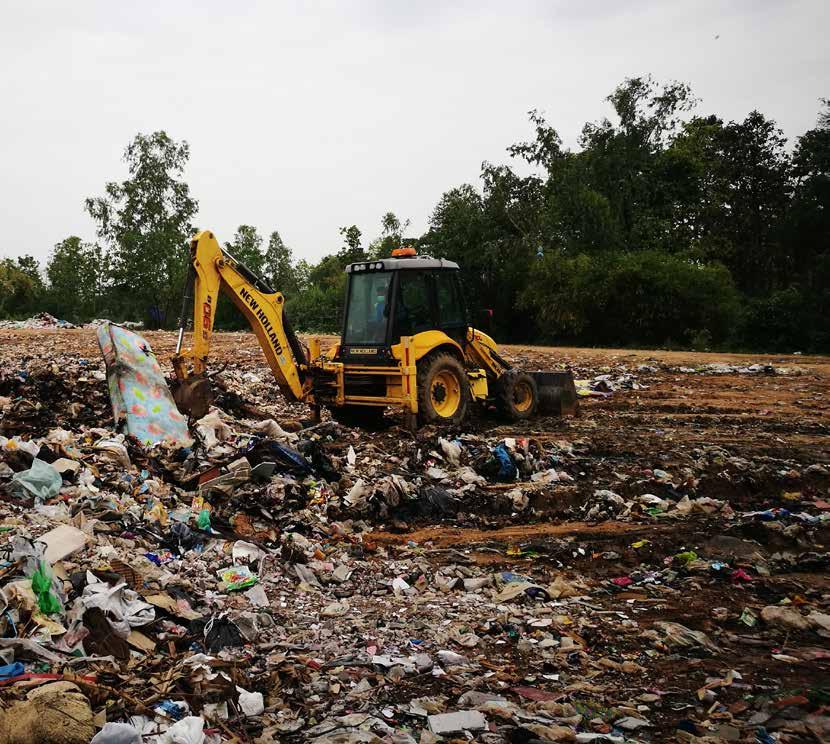
4 minute read
How are smaller municipalities expected to manage landfills?
by 3S Media
Our Constitution gives South African citizens the right “to an environment that is not harmful to their health and well-being”. It also states that one of the objects of local government is to “promote a safe and healthy environment”.
By Chris Wiid*
Advertisement
The Local Government Municipal Systems Act (No. 32 of 2000) sets out that one of the duties of municipal councils is to “promote a safe and healthy environment in the municipality”. It is worth re-stating the above in order to remind ourselves of municipal obligations in the context of solid waste management.
Having established a background, one has to ask whether municipally operated landfill sites are indeed poorly managed? Some clearly are, and these are generally the small to medium sites. Why, then, are they not being operated properly? Simply put, the key elements of providing this service (planning, resources, finances, capacity, commitment and support) are largely absent.
The task of the provision of a solid waste management service is underestimated and is often seen as messy, an irritation and something that can be given superficial attention in the hope that it will go away. The latter part is key – it will not go away and, indeed, carries on getting bigger. This is where smaller municipalities face significant challenges. First, the landfill is often a historical dumpsite located in a remote corner of town.
The site would typically not satisfy most of the technical requirements and would probably be best closed – but it is there and it is all that is available. With increasing populations and the tightening of environmental requirements, these sites are often thrust into stark view. The municipalities in question are suddenly obliged to manage the sites to a high standard but are expected to do so within the same deficient system and with equally deficient resources.
This can start from the upper-level managerial structures (who lack an appreciation of the complexities of waste management and, consequently, do not plan adequately nor provide sufficient resources) and includes plant and equipment managers who do not recognise the need for adequate, operational equipment.
In terms of staff, there is often no dedicated post for the required people and duties are an ‘add-on’ to, for instance, a community health or environmental official. The officials are untrained and largely unsupported – this results in a lack of motivation and increasing levels of frustration. When it comes to site staff, the same applies – they are inadequately trained and insufficiently resourced.
A common lament from management is that there are no funds. This is probably the biggest challenge facing municipal officials. Waste management is the Oliver Twist in the queue for funds – always wanting more and never given enough. There are many other hungry orphans in the same queue who enjoy the privilege of bowls of financial gruel that are full.
The result of the above are sites that steadily deteriorate while staff play a catch-up game they cannot win.

*Chris Wiid is a civil and infrastructure engineer.
What, then, can be done?
Perhaps more pragmatically, we should ask what exactly is achievable. Clearly, there is no silver bullet and small steps would be a starting point. How about training? Streamlined and focused training should concentrate on the job description (as opposed to trying to make waste managers out of all staff members). In this way, an operator can be taught how to deal with waste at the landfill work face and does not necessarily need to understand the intricacies of an integrated waste management plan.
The community health officer mentioned above would need broader training, as they would have to manage other aspects of waste management as well – including collection and transport. This will enable them to gain a broader understanding of their tasks.
The designated waste management officer would need the most training, as their duties would include policy and planning. The latter aspect must never be underplayed. Overall planning, at the most basic level, would inform (or drive) financial planning and budgeting.
A further aspect that deserves recognition is that of plant provision and maintenance. The manager responsible must be made to understand the nature and operational demands of landfill site plant. Two multipurpose items of plant that are generally part of even a small municipality’s fleet are a tractor-trailer and the ubiquitous digger-loader (TLB). These two can achieve a great deal on a small site and can also perform valuable duties on other, nonwaste tasks.
There is also a need for a ‘fit-for-purpose’ approach – in the case of smaller sites, for example, it is unrealistic to expect the provision of a landfill compactor; instead, a simple, towbehind roller can be used. Again, this a generally already part of the municipal plant complement. Maintenance is often a major challenge, where plant that breaks down is neither repaired nor replaced. Outsourcing is a further option. Municipalities are (with necessary controls) permitted to outsource. Staying within that which is achievable, the supply, operation and maintenance of small items of plant can be secured in this way.
Rome was not built in a day and small beginnings with realistically achievable tasks are a starting point. Affordable training is available and the first step in sensitising role players and building capacity. The fundamental approach is surely to arrest the backslide and start from there.

Disclaimer: This article is the author’s own view. It is a generalisation, seeks to promote discussion and is not intended to cast aspersions on the performance of municipal or private entities. Furthermore, the contribution of the many dedicated municipal staff members is acknowledged.










